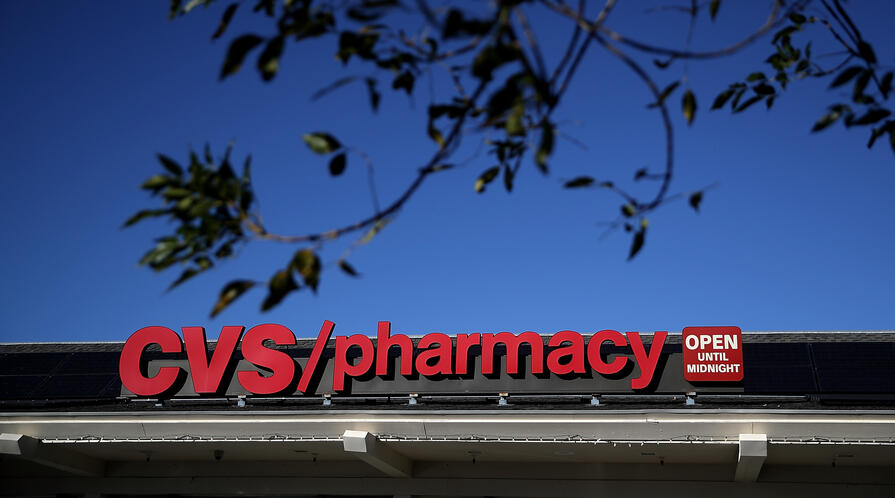A CVS-Aetna merger could revamp health-care industry for consumers

CVS Health announced it would buy Aetna, the country’s third-largest health insurance company for $69 billion, a deal that could revamp the nation’s health-care industry and impact millions of consumers who are always on the lookout for better delivery and costs.
The merger, which must still undergo an antitrust review by the government, could impact the cost of drugs and the way patients visit health-care providers.
“This combination brings together the expertise of two great companies to remake the consumer health-care experience,” CVS Health President and CEO Larry J. Merlo said in a statement on Dec. 3. “With the analytics of Aetna and CVS Health’s human touch, we will create a health-care platform built around individuals.”
Merlo said that by using CVS’s 10,000 pharmacy locations around the country, they would make health care more affordable and accessible.
We asked Stanford Health Policy’s Laurence Baker, chair of Stanford Medicine’s Department of Health Research and Policy and an expert on health-care delivery and costs, several questions about the potential merger.
Q. Could this lead to lower drug prices for the consumer?
Baker: One of the hoped-for effects is that a combined Aetna-CVS would be better able to negotiate favorable prices for prescription drugs. It is possible I suppose, since together they would have a considerable amount of information and strengthened incentives to control costs. In a model where a pharmacy benefit manager, like CVS, did most of the negotiating with the pharmaceutical companies, and insurers like Aetna separately paid the costs, there might be less ability and incentive to negotiate for favorable prices than if the two do merge.
At the same time, there is no guarantee that there will be savings and if there are it is not clear that they would be very large. CVS and others have been negotiating for drug prices already, and the advantages conveyed by the merger need not be that big. I can only imagine that if there were lots of low-hanging fruit Aetna and CVS, and others, would already have had some good opportunities to pursue changes.
One place where a combined Aetna-CVS could make a difference would be in working with doctors and patients, doing more to promote the use of better or higher-value drugs. A merged entity might be more effective at getting patients to use appropriate generics rather than expensive branded drugs, for example. This effect could be even stronger if a merged company were to be successful in their announced plan to do more to integrate physicians and other health-care providers with CVS pharmacies.
Q: If there were savings, would consumers see them?
Baker: If a combined Aetna-CVS were to negotiate better drug prices, whether or not those are passed on to consumers or just retained by the company depends on things like the degree of competition in the insurance marketplace. If the company could benefit from lowering prices for, say, Aetna insurance policies because of the lower drug prices, at least some of the savings could be passed on to consumers. But we often worry that many insurance markets are not competitive enough, so it would remain to be seen whether consumers would see the benefits or not.
The effects of stronger efforts to move patients toward higher-value or lower-cost drugs also might or might not flow through directly to patients. Overall savings may or may not be passed on, but it is possible that some patients would see changes in their copayments that could be beneficial.
Q: Could the potential merger lead to new and improved methods of delivering care?
Baker: Leaders of CVS and Aetna talked about the potential for building new and improved methods for health care delivery, including having more care delivered through clinics associated with CVS stores. These are intriguing ideas, consistent with many discussions going on about the next generation of health-care delivery. It isn’t entirely clear why a merger is needed to develop this, nor is it clear that it would lead to widespread improvements in health care, but innovation in this area doesn’t seem likely to do harm either and would probably benefit some people.

Q: Would this result in reduced consumer choice of health care provider?
Baker: It does stand to reason that a merged Aetna-CVS might prefer that people with Aetna insurance use CVS rather than other competitors. They might develop restrictions or incentives that would steer their customers in this direction, and that could certainly be a concern for some people. This gets at a larger question facing the health-care system these days. It may be that the formation of more integrated care networks, with less provider choice overall, but with providers that are carefully chosen and better at working together, offers opportunities to improve care and lower costs. This could have advantages, but would also come with tradeoffs for choice.
Q: Would a merger lead to a company that is “too big” with too much power?
Baker: One thing analysts have worried about lately is the amount of consolidation in the health-care marketplace. This would be another example of that, combining two already large players. Sometimes people argue that bigger can be better if it helps align the activities of different players in ways that could push us toward lower costs or improve quality. Often enough, however, we have seen consolidation lead to higher prices without seeing improved quality. This particular type of merger — combining a health insurer with a health care provider — is a bit less common than the consolidation we’ve most commonly seen such as hospitals merging and has some different features, so the overall effects will be something analysts will want to keep an eye on.
